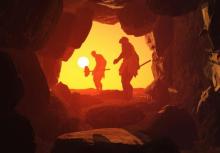Neanderthal extinction
15 Leaps forward in our understanding of Human Evolution in 2023
We learned so much about the Neanderthals capabilities, that some researchers even started to question whether they were really a separate species to us
1.8-Million-Year-Old Tooth Found in the South Caucasus
The remains suggest that the area was one of the first homes for early humans outside Africa
French cave tells new story about Neanderthals, early humans
A hillside dwelling overlooking the picturesque Rhone Valley in southern France proved irresistible for our ancestors, attracting both Neanderthals and modern humans long before the latter were thought to have reached that part of Europe, a new study suggests.
Two Romanian researchers sign article in Nature journal: Neanderthals passed genes to first modern humans
Researchers Oana Teodora Moldovan and Silviu Constantin from the "Emil Racovita" Institute of Speleology of the Romanian Academy recently signed an article in Nature journal, together with an international team of archaeologists and speleologists, that shows that there was a genetic transfer, resulting from the interbreeding between the Neanderthals and the first anatomically modern humans to a
War in the time of Neanderthals: How our species battled for supremacy for over 100.000 years
Neanderthals fascinate us because of what they tell us about ourselves – who we were, and who we might have become
The Oldest Homo Sapiens In Europe Found in a Bulgarian Cave
Scientists have found bones in a Bulgarian cave that show modern humans may have arrived in Europe thousands of years earlier than previously thought, at a time when the region had long been home to Neanderthals.
Chinese fossil sheds light on mysterious Neanderthal kin
Nearly 40 years after it was found by a monk in a Chinese cave, a fossilized chunk of jawbone has been revealed as coming from a mysterious relative of the Neanderthals.
Neanderthal Genes could Explain the Shape of our Skulls, Study Finds
Humans have unusually globular (or round) skulls and brains compared to our ancient ancestors -- including our closest extinct cousins the Neanderthals -- and a new study provides a possible explanation as to why, reports CNN.




